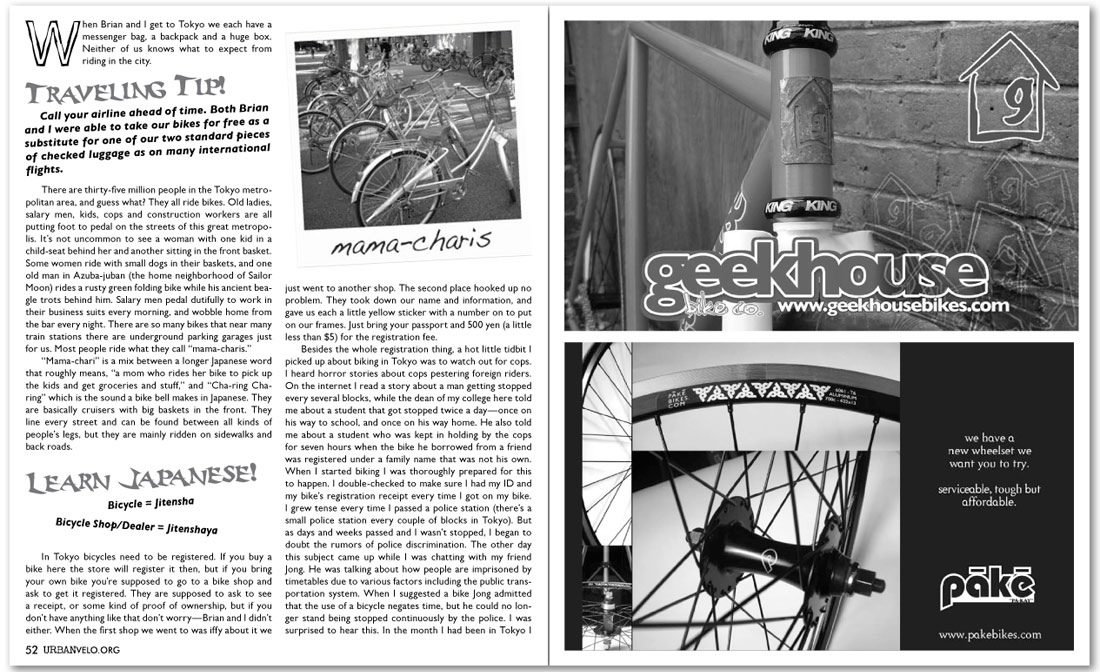| American Bike Punks In Tokyo... Continued.
When Brian and I get to Tokyo we each have a messenger bag, a backpack and a huge box. Neither of us knows what to expect from
riding in the city.
Traveling Tip!
Call your airline ahead of time. Both Brian and I were able to take our bikes for free as a substitute for one of our two standard pieces of checked luggage as on many international flights.
There are thirty-five million people in the Tokyo metropolitan area, and guess what? They all ride bikes. Old ladies, salary men, kids, cops and construction workers are all putting foot to pedal on the streets of this great metropolis. It’s not uncommon to see a woman with one kid in a child-seat behind her and another sitting in the front basket. Some women ride with small dogs in their baskets, and one old man in Azuba-juban (the home neighborhood of Sailor Moon) rides a rusty green folding bike while his ancient beagle trots behind him. Salary men pedal dutifully to work in their business suits every morning, and wobble home from the bar every night. There are so many bikes that near many train stations there are underground parking garages just for us. Most people ride what they call “mama-charis.”
“Mama-chari” is a mix between a longer Japanese word that roughly means, “a mom who rides her bike to pick up the kids and get groceries and stuff,” and “Cha-ring Cha-ring” which is the sound a bike bell makes in Japanese. They are basically cruisers with big baskets in the front. They line every street and can be found between all kinds of people’s legs, but they are mainly ridden on sidewalks and back roads.
Learn Japanese!
Bicycle = Jitensha
Bicycle Shop/Dealer = Jitenshaya
In Tokyo bicycles need to be registered. If you buy a bike here the store will register it then, but if you bring your own bike you’re supposed to go to a bike shop and ask to get it registered. They are supposed to ask to see a receipt, or some kind of proof of ownership, but if you don’t have anything like that don’t worry—Brian and I didn’t either. When the first shop we went to was iffy about it we just went to another shop. The second place hooked us up no problem. They took down our name and information, and gave us each a little yellow sticker with a number on to put on our frames. Just bring your passport and 500 yen (a little less than $5) for the registration fee.
Besides the whole registration thing, a hot little tidbit I picked up about biking in Tokyo was to watch out for cops. I heard horror stories about cops pestering foreign riders. On the internet I read a story about a man getting stopped every several blocks, while the dean of my college here told me about a student that got stopped twice a day—once on his way to school, and once on his way home. He also told me about a student who was kept in holding by the cops for seven hours when the bike he borrowed from a friend was registered under a family name that was not his own. When I started biking I was thoroughly prepared for this to happen. I double-checked to make sure I had my ID and my bike’s registration receipt every time I got on my bike. I grew tense every time I passed a police station (there’s a small police station every couple of blocks in Tokyo). But as days and weeks passed and I wasn’t stopped, I began to doubt the rumors of police discrimination. The other day this subject came up while I was chatting with my friend Jong. He was talking about how people are imprisoned by timetables due to various factors including the public transportation system. When I suggested a bike, Jong admitted that the use of a bicycle negates time, but he could no longer stand being stopped continuously by the police. I was surprised to hear this. In the month I had been in Tokyo I had been riding every day, and not once had I
|
|
|
|
|
|

